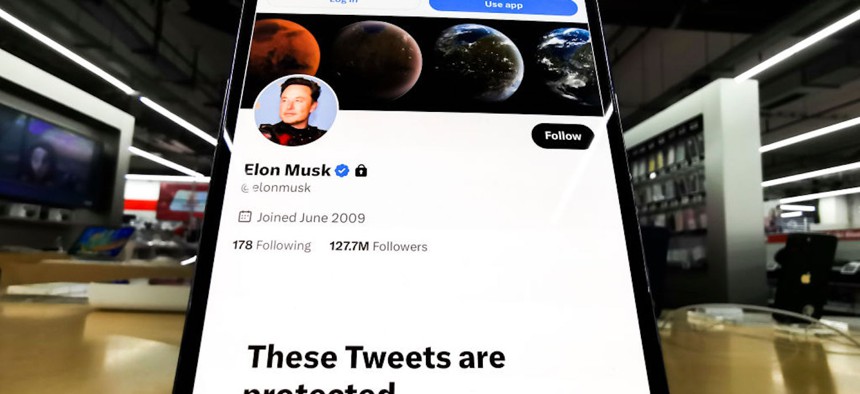
Elon Musk Twitter account turned into private one is seen on a mobile phone screen for illustartion photo. Krakow, Poland on February 1, 2023 Photo by Beata Zawrzel/NurPhoto via Getty Images
Foreign Governments Are Still Targeting Americans on Social Media, NSA Says
U.S. government efforts to stem these infowar efforts are meeting resistance.
China and other foreign governments are still working to weaponize information against Americans, despite efforts by the U.S. government and social-media companies, the head of the National Security Agency testified on Tuesday.
“We've seen it in the elections. We've seen it with Russia, Ukraine, we've seen it with Iran, the same actors that…interfere in our elections are the same actors that are doing influence operations,” Gen. Paul Nakasone told a Senate Armed Services Committee hearing. “We see the influence piece much more prevalent these days.”
But: “We go after them,” said Nakasone, who also leads U.S. Cyber Command.
That starts with identifying those actors overseas, he said. “We find them and we continue to ensure that we understand exactly what they're doing. We examine their tradecraft and then we share it with a series of different partners. This is only done effectively…with partners, so inside the United States, sharing signatures with the FBI, who share it with social media companies.”
These efforts have recently been painted as nefarious by, among others, Twitter CEO Elon Musk. In December, Musk gave various internal Twitter documents to independent journalists Matt Taibbi and two others, who argued that they show government entities essentially bribing social media companies to censor information. The insinuation, thus, was that the government’s efforts to curb foreign disinformation on sites like Twitter via mechanisms like the FBI's Foreign Influence Task Force were innately corrupt and political in origin. (Taibbi’s methodology and conclusions are themselves controversial; nevertheless, he has been invited to testify later this week before the GOP-led House’s brand-new weaponization of the government committee.)
But Russian influence operations on Twitter are well-documented—including by the Republican-led Senate Intelligence Committee in a 2020 report—though the overall effect of those efforts is still subject to some debate. Twitter, meanwhile, has become more susceptible to foreign disinformation due to Musk’s firing of key employees in charge of moderation and his extension of “verification” status on the basis of paid subscription. Twitter has also failed to submit its plan for halting disinformation, as required by the European Union’s Digital Services Act.







